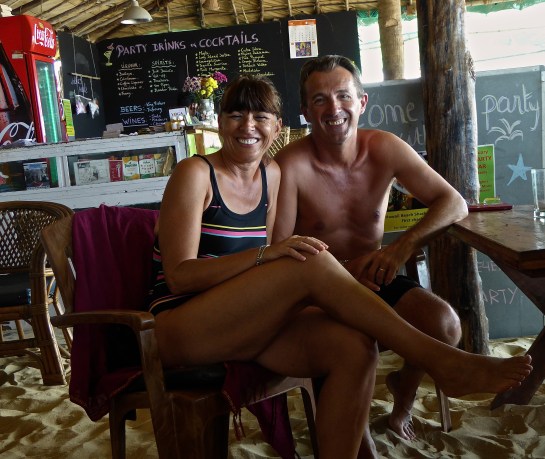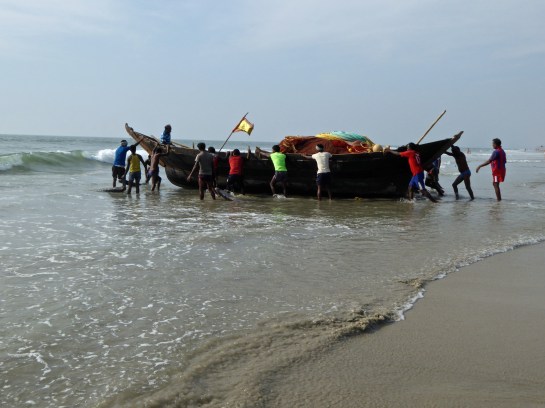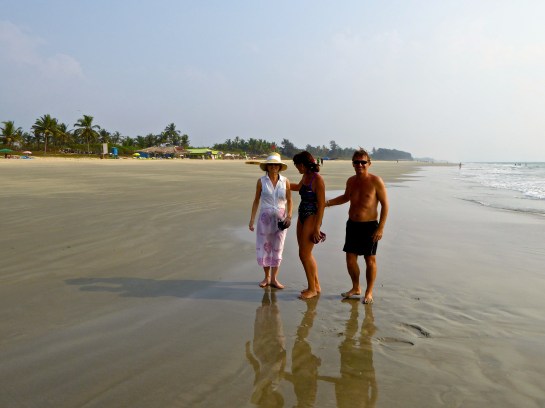
Each year we return to Agonda there’s more change – more tourism, less fishing. And this year is no exception. But one constant is Fatima’s birthday party. We’ve known Fatima since we first arrived many years ago and stayed at her guesthouse, before moving to Dominic and Rita’s.

Her party is an open event with a full buffet, musicians, dancing girls, and a fire dancer.

New shops have sprung up like mushrooms after a spring rain. Almost every square foot has been filled with restaurants, cafes, and stalls. But it appears the merchants are appealing to a different clientele – the new shops are glass fronted with halogen lights, selling expensive Kashmiri jewelry and shawls. And the people coming here seemed to have changed. Most notably, the Indian tourists have arrived, and they have money to burn. But down at our far end of the beach it is not that different.
Many of the regulars are still here, but some friends have not come due to old age or bad economy. We were so pleased that our friends, Frederic from France
and Michael Golding from London, were here for at least the first week. Tatiana, who has been staying in our guesthouse almost as long as we have, was telling us the plight of the ruble. Five or six years ago it was 30 to the $1 then it dropped to 60, this year it’s around 80/90. No wonder we haven’t seen many Russians around.
We share our balcony with a young couple from Lithuania and Gerard inquired about how the economy was there. They smiled at each other, and said, “We’re hoping we don’t have to go back.” Gerard’s interest was piqued when Victorija (named after the Queen) said that the average salary was around 280/300 E a month. Out of that, 100 E goes for rent, and almost another 100 for utilities. It sounded quite grim. Then she said, “Unemployment is high and there’s little motivation to get a job because welfare is almost the same as an average salary.”

We were both reminded of England in the late 60s/early 70s, when Gerard was working in London. His take home pay was £10 per week; rent was £4½, which didn’t leave much for food, heat, or the little extras in life. Gerard suggested as a cost saving scheme that I should move in immediately. Americans are an impulsive bunch. I hoped I knew what I was getting into! Meanwhile a lot of our friends in England were collecting £9 a week on welfare.
Working as a graphic designer, Victorija was gone from the house twelve hours a day and was frequently required to work overtime for no pay. “If you don’t like it, you can leave,” she was told. Ron (named after President Reagan) worked in a hospital. He said, “Lithuanians are a sad and depressed people. Crime and suicide rates are high, and alcoholism is a major problem. We don’t want to go back.”
“So where are you going?” we asked. “We’ll try our luck in Spain. We know the economy is not good but it’s better than Lithuania and housing is cheap.” They think they can support themselves with an Internet based business. Ron is already selling on eBay and talked about online gaming. They tell us there are more Lithuanians living in Europe than in Lithuania.
Asked why they came to India in the first place, Victorija replied, “I wanted to learn yoga.” They’d read a popular Lithuanian book about India that also mentioned Agonda. So Victorija enrolled here in a month long yoga teacher training course. They are vegans, like an increasing number of young western travelers, and when we took them to dinner, they consumed together no less than seven servings of rice! Even the waiter was amazed!

Ron said that since a young boy he has eaten an inordinate amount of rice! In this respect India suits them well. Both 24 years old, we liked the self-confidence in leaving their homeland with little money in their pocket and setting out to find a new life.
Back in the guesthouse loggia, Tatiana talks more about the Russian economy. To live in Moscow, she says, “You must find a way to be flexible. The government wants to take all your money.’ Gerard says all governments have that in mind. Tania says, “Yes, but the difference in Russia, the government not only has it mind, but does it!”

Worse still there is no sun in Moscow. It may be shining 400 kms away, but in Moscow, she says,” it’s rain, rain, rain…then snow. The government has controlled even the weather!” If the weather is so bad, you just go to work, come home and go to work again. No inclination to think about anything else, and that’s just what the government wants. But when there’s a national holiday, like May Day, the sun always shines. She believes the government then artificially forces the rain clouds away from the city and instead rain falls in sheets in the suburbs. We don’t want rain falling on the May Day parade now do we? If the government really can control the weather, they should sell the technology to Britain. Since the ruble is near worthless, the government has devised a scheme to encourage the few Russians, who can afford to take a vacation, to holiday within the motherland by giving them a $600 credit.
We’ve no way of knowing if Tatiana is typically Russian or not, but in the few years we’ve known her, we’ve grown very fond of her. She’s also an inspiration regarding her photography.



















 For eons Indians have dumped their trash wherever they felt like it and it posed little problem – but in the past 50 years with the arrival of plastic it’s now become a serious issue. Trash thrown into the bushes only a couple of meters behind the guesthouse has grown into mounds of plastic and an off-shore breeze picks it up and blows it on to the street and, further, toward the beach. This year we notice construction debris – broken pieces of concrete and tile thrown carelessly along the roadside. It is true that local and state governments have no conception of how to deal with the increasing amount of trash the tourist industry is creating here.
For eons Indians have dumped their trash wherever they felt like it and it posed little problem – but in the past 50 years with the arrival of plastic it’s now become a serious issue. Trash thrown into the bushes only a couple of meters behind the guesthouse has grown into mounds of plastic and an off-shore breeze picks it up and blows it on to the street and, further, toward the beach. This year we notice construction debris – broken pieces of concrete and tile thrown carelessly along the roadside. It is true that local and state governments have no conception of how to deal with the increasing amount of trash the tourist industry is creating here.
